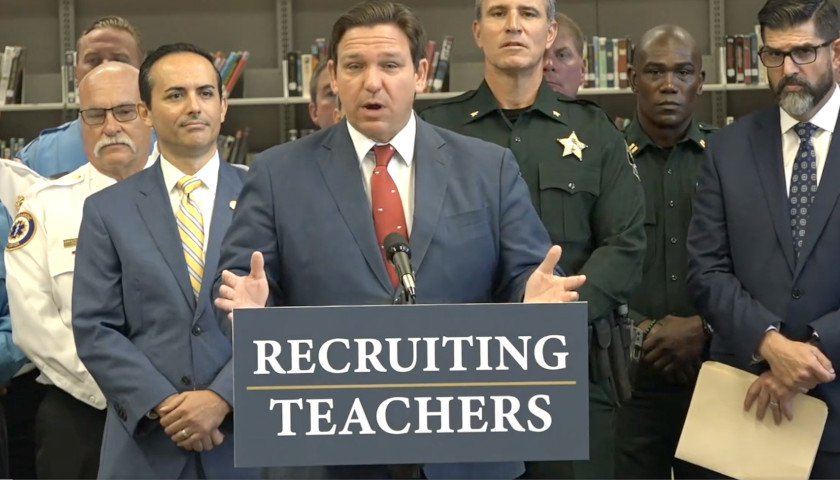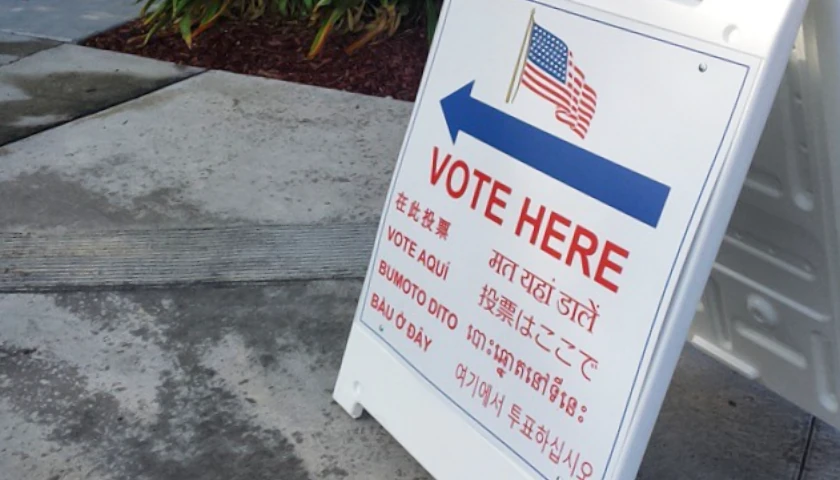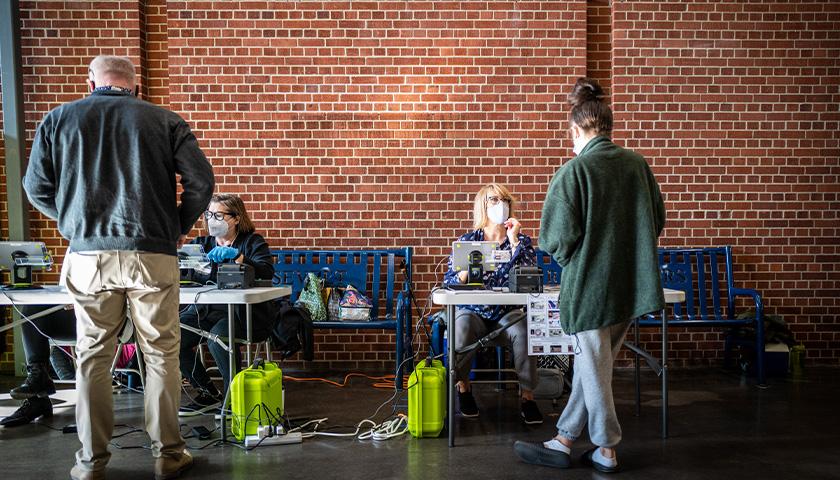Florida Governor Ron DeSantis (R) announced a plan to recruit public school teachers from other sectors of the community and retain effective teachers who can apprentice new recruits.
In a press conference Tuesday, DeSantis discussed three proposals he is presenting for Florida’s 2023 legislative session, all of which seek to recruit “the best and brightest” teachers in the state’s public school classrooms.
Gov. DeSantis Announces New Teacher Recruitment Initiatives https://t.co/WyA63dpJBP
— Ron DeSantis (@GovRonDeSantis) August 16, 2022
At the same time, the governor addressed the close connection between the decline in American culture and the infiltration of “ideologies” into public schools.
“Obviously in the classroom, we’ve battled a lot of ideologies,” DeSantis said. “But what I’ve said is that the state of Florida is the state, is the place, where Woke goes to die.”
“We are not going to let this state descend into some type of woke dumpster fire,” he asserted. “We’re going to be following common sense. We’re going to be following, you know, facts, and that’s just really, really important.”
Today, I announced three new proposals for the 2023 Legislative Session that are focused on recruiting more teachers to support our students in the classroom.
We are committed to having the best and brightest in our classrooms educating our students. pic.twitter.com/ochWGfOe6a
— Ron DeSantis (@GovRonDeSantis) August 17, 2022
In announcing his three proposals, DeSantis spoke about how the experience of individuals who have already served the community as military veterans, first responders, and law enforcement officers can be valuable to children in the classroom.
“We believe that the folks that have served our communities have an awful lot to offer, and we’ve got people that have served you know, 20 years in law enforcement, they retire, and some of them are looking for kind of the next chapter in their life,” he noted.
The governor’s first proposal, called the “heroes bonuses program,” would allow retired military veterans and first responders with bachelor’s degrees who commit to teaching to receive a “sign-on bonus and an additional bonus for teaching in a shortage area.”
According to the plan, teacher certification exam fees for retired first responders would be waived. DeSantis explained how he and Florida lawmakers have addressed the issue of retired military veterans who already qualify for the program:
The legislature passed, and I signed a bill recently, identifying military veterans that have four years or more of active duty, honorable service, who have 60 college credit hours, who have passed the exam. And what they would basically be able to do is they would be able to get a temporary certificate, be able to teach and then obviously work to get their bachelor’s degree, and it was unanimously passed by the legislature. You know, some of the media just recently started attacking us over this. They said, “You can’t just put any old warm body in the classroom.” And look, as a veteran, I will tell you the people that serve our country are not just some warm body.
The plan calls for those who are eligible for the retired veterans and first responders initiative to receive a $4,000 bonus and an additional $1,000 for teaching in a shortage area.
A second proposal would allow apprentices to get paid while team teaching with a mentor teacher to develop classroom skills as they work toward a bachelor’s degree. Mentor teachers would receive a $4,000 bonus “for successfully guiding an apprentice.”
Finally, the governor’s third proposal would provide teachers a scholarship to earn their master’s degree “so they can teach dual enrollment courses on a high school campus.”
The initiative would “give greater access to dual enrollment for rural and low income students” while it also addresses the shortage of teachers who are able to teach dual enrollment classes.
In his remarks during the press conference, DeSantis discussed the decline of America’s culture, particularly at the hands of public schools and teachers who have graduated from “education schools” that have been “overtaken by ideology” and are now “indoctrinating” students:
And so, I think that’s a turn-off for a lot of people because at the end of the day, I think most people that would want to get into it, they want to get into it, and they want to be there and they want to be helping students. They don’t want to be kind of a cog in some indoctrination machine. And that’s what we in Florida – our mantra has been our schools are to educate kids, not indoctrinate kids.
Florida’s Education Accomplishments:
– Ended Common Core
– Expanded School Choice
– Record Increase in Teacher Pay
– No Tuition Increases at State Universities
– Investments in Early Literacy, American Civics and Workforce Education
– Ended the FSA pic.twitter.com/2Vx5fpL2Nd— Ron DeSantis (@GovRonDeSantis) August 17, 2022
The governor also emphasized the key accomplishments of his administration in the area of education, including the elimination of the Obama-era Common Core standards; the end of Florida Standards Assessment (FSA) testing and creation of a progress monitoring system to measure student performance throughout the year; the expansion of school choice; a record increase in teacher pay; and investments in early literacy, American civics instruction, and workforce education.
Regarding his initiative to emphasize the principles of America’s founding in civics instruction, DeSantis said students should:
… have an understanding of what it means to be an American, understanding where our rights come from, understanding how the Constitution is structured, understanding how all those ideas have been important in various periods of American history from the American Revolution through the Civil War, World War Two, civil rights movement through the Cold War, and also having an effort to show how America is different than other systems.
“I’m a big believer in being equipped to do things in life and be productive – sometimes that means going to a four-year brick and ivy university,” the governor also said about workforce education. “That is not the best pathway for everybody. And certainly, when you’re going down a university pathway, and you go $100,000 in debt like many students have, and then you end up with a degree that’s not worth the paper it’s printed on, that’s not a good investment. That’s a millstone around your neck.”
– – –
Susan Berry, PhD, is national education editor at The Star News Network. Email tips to [email protected].
Photo “Ron DeSantis” by Ron DeSantis.




